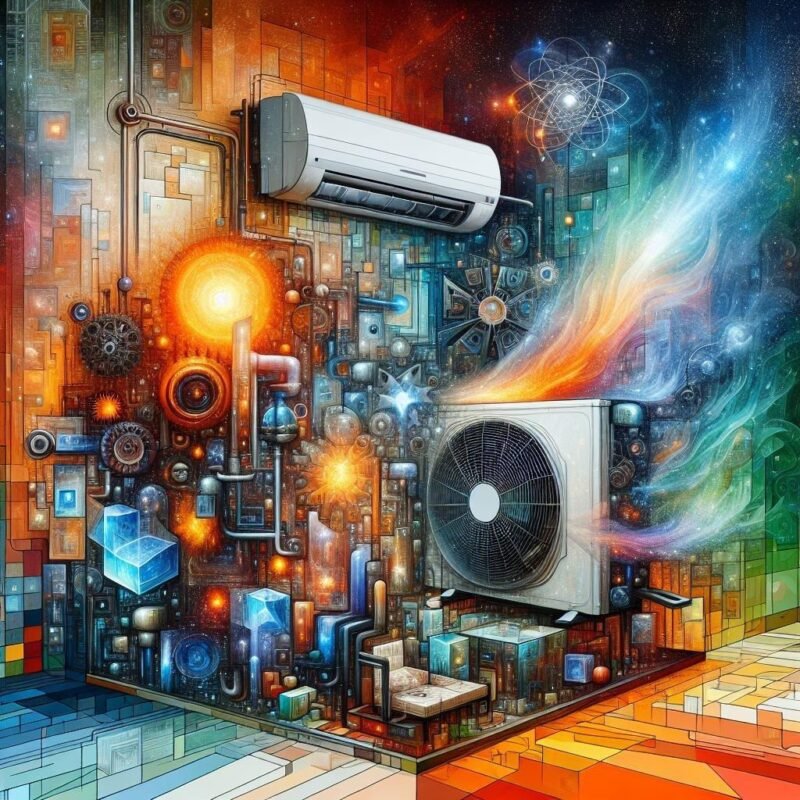A Beginner’s Guide to Understanding Mini Split AC Technology

Picture this: a sleek, whisper-quiet device mounted on your wall that brings perfect comfort to your room without teh hassle of bulky ductwork or window units. That’s the magic of mini split AC systems, the unsung heroes of modern cooling technology. Whether you’re tired of wrestling with customary air conditioners or simply curious about upgrading your home’s comfort game, you’re about to embark on a journey into the captivating world of mini splits. From their ingenious design to their energy-sipping efficiency, this guide will demystify everything you need to know about these clever cooling companions that are revolutionizing how we think about indoor climate control.
Mini Split Magic: Understanding the Basics of Ductless Cooling
Ever wondered how these sleek, wall-mounted units can transform a sweltering room into a cool oasis? These innovative climate control systems operate by connecting an outdoor compressor to one or more indoor units through small refrigerant lines.Unlike their bulky central air counterparts, these modern marvels don’t require extensive ductwork, making them perfect for room-by-room cooling and retrofit installations in older homes.
The beauty of ductless technology lies in its simplicity and efficiency. Each indoor unit acts as its own temperature zone,allowing you to cool specific areas while leaving others untouched. This targeted approach not only saves energy but also ensures everyone in your home stays agreeable according to their preferences. Plus,with advanced filtration systems and whisper-quiet operation,these systems deliver more than just cool air – they create a healthier,more peaceful living environment.
- Zero ductwork required
- Individual room temperature control
- energy-efficient operation
- Speedy and clean installation
| Feature | Benefit |
|---|---|
| Inverter Technology | Up to 30% energy savings |
| Multi-Zone Setup | Cool up to 8 rooms |
| Smart Controls | WiFi-enabled operation |
Breaking Down Your Mini split: Essential Components and How They Work Together
At the heart of your mini split system lies a dynamic duo: the outdoor condenser unit and the indoor air handler. These components work in perfect harmony, with the outdoor unit housing the compressor, which acts as the system’s powerhouse. Think of it as a tireless worker that pressurizes refrigerant to enable the heat exchange process. Meanwhile, the indoor unit, mounted high on your wall or ceiling, quietly distributes the perfectly conditioned air throughout your space.
The magic happens through several key players working behind the scenes:
- Evaporator Coil: The indoor unit’s cooling superstar that absorbs heat from your room
- Condenser Coil: Your outdoor unit’s heat-releasing champion
- Variable-Speed compressor: The brain that adjusts cooling power based on your needs
- Electronic expansion Valve: The gatekeeper controlling refrigerant flow
| Component | Primary function |
|---|---|
| Indoor Unit | Air Distribution |
| Outdoor Unit | Heat Exchange |
| Refrigerant Lines | Heat Transfer |
Smart Installation Spots: Finding the Perfect Home for Your Indoor and Outdoor Units
Selecting the right locations for your mini-split components can make a significant difference in both efficiency and aesthetics. For indoor units, consider mounting them on walls that face the most-used areas of your rooms, typically 7 to 8 feet above the floor. Keep them away from direct sunlight and heat sources like lamps or kitchen appliances. The perfect spot allows for unrestricted airflow while avoiding obstacles such as curtains, tall furniture, or decorative elements that might interfere with the unit’s performance.
The outdoor unit demands equally thoughtful placement considerations. Look for a shaded area with proper drainage and stable ground, ideally on a concrete pad or mounted brackets. Maintain these crucial clearances:
- At least 24 inches from walls or obstacles
- 4 feet clearance above the unit
- 10 feet away from dryer vents or kitchen exhausts
- Protected from falling icicles or heavy snow
| Location Type | Benefits |
|---|---|
| North-facing wall | less direct sun exposure |
| Under roof overhang | Weather protection |
| Corner spaces | Maximizes room aesthetics |
Maximizing Comfort and Savings: Pro Tips for Operating Your Mini Split System
Getting the most out of your mini split system doesn’t have to be rocket science. Start by setting your desired temperature and sticking to it instead of constantly adjusting the thermostat. A consistent temperature between 68-72°F during winter and 74-78°F in summer typically provides optimal comfort while keeping energy bills in check. Remember to take advantage of the unit’s programmable features – schedule temperature adjustments for when you’re sleeping or away from home.
Smart operation habits can make a significant difference in both comfort and efficiency. Here are some game-changing practices:
- Keep doors and windows closed when the system is running
- Clean or replace filters every 2-3 months
- Use the unit’s “dry mode” during humid days
- Position furniture away from indoor units for proper airflow
- Take advantage of the sleep timer function
| Mode | Best used For | Energy Impact |
|---|---|---|
| Auto | Daily operation | Moderate |
| Dry | Humid days | Low |
| Fan Only | Mild weather | Minimal |
Q&A
Q&A: A Beginner’s guide to Understanding Mini split AC Technology
Q: What is a mini split AC system?
A: Great question! A mini split AC system is a type of air conditioning that doesn’t require ductwork. It’s like the cool cousin of traditional central AC systems! It consists of two main parts: an indoor unit that blows cool air into your space and an outdoor unit that helps to dissipate heat. You install the indoor unit on the wall or ceiling, and voilà – instant comfort!
Q: How do mini split AC units work?
A: Imagine a superhero duo! The outdoor unit is the “energy wizard,” extracting heat from the air outside (even when it’s hot out!). It sends this heat through refrigerant lines to the indoor unit, which is the “cool breeze generator.” The indoor unit then cools the air and blows it into your room,creating that delightful oasis we all crave on a hot day.
Q: Are mini split systems energy efficient?
A: Absolutely! Mini splits are like the eco-friendly champions of the AC world. Because they don’t rely on ductwork, they lose less energy, which means lower electricity bills. With their inverter technology, they can adjust their speed based on the room’s needs, keeping things comfortable without wasting energy.
Q: Can I install a mini split AC myself?
A: If you enjoy a DIY project, you might want to rethink this one! While some handy folks out there might successfully install a mini split themselves, it’s typically best to leave it to the pros.Why? Because proper installation is key to ensuring the system runs efficiently and effectively.Plus, licensed HVAC professionals can navigate the technical elements, like refrigerant handling and electrical components.
Q: How noisy are mini split units?
A: Think of them as quiet companions. Most mini split indoor units operate at levels quieter than a whisper-around 20 to 30 decibels. For reference, that’s like the sound of rustling leaves! So, whether you’re trying to catch a nap or binge-watch your favorite show, you won’t have to worry about noise.
Q: Can a mini split system provide both heating and cooling?
A: Definitely! Many mini split units come with a “heat pump” feature that allows them to reverse the refrigeration cycle.In the winter months, they can pull heat from outside (yes, even chilly air holds some warmth) and bring it indoors, keeping you cozy when temperatures drop. Talk about versatility!
Q: How do I maintain my mini split AC?
A: Keeping your mini split happy is simple! Regularly clean or replace the filters (every couple of months), check the outdoor unit for debris, and schedule a professional tune-up once a year.Just a little TLC goes a long way to ensure your mini split runs smoothly and efficiently.
Q: Are mini splits suitable for all homes?
A: While mini splits are fantastic, they may not be the perfect fit for everyone. They work wonders in spaces without ductwork, in home additions, or even for zoning diffrent rooms with individual temperature controls. If you’re considering a new installation, talk to an HVAC expert about your specific space and needs!
Q: What’s the biggest benefit of choosing mini split technology?
A: Let’s wrap it up with the cherry on top! The biggest benefit of mini split AC systems is their versatility. Whether you need a cooling solution for a small room, a large open space, or a home office in the attic, mini splits can be tailored to your unique needs. Plus, they’re energy-efficient, stylish, and can keep you cool in the summer and cozy in the winter-what’s not to love?
If you’re ready to take the plunge into the world of mini split AC technology, may your journey be cool, breezy, and ever so comfortable! Happy cooling!
Final Thoughts
As we wrap up this journey into the world of mini split AC technology, we hope you feel equipped with the knowledge and confidence to embrace these modern cooling wonders. Whether you’re seeking relief from the summer heat or simply looking to create the perfect climate in your home, mini splits offer a versatile and efficient solution for all your comfort needs.
Remember, choosing the right system is just the first step. Installation, maintenance, and understanding how to maximize efficiency will all contribute to your mini split’s performance-and your comfort. So,take your newfound knowledge and step into the world of energy-efficient cooling with enthusiasm!
Thank you for joining us on this exploration! We encourage you to reach out with any questions or share your mini split experiences. Here’s to a cooler tomorrow, one room at a time!






















